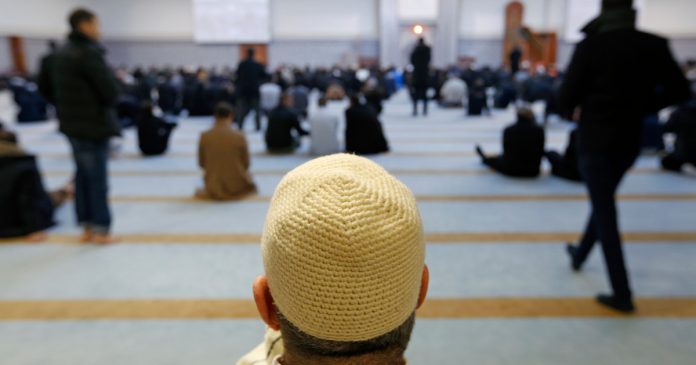[ad_1]
Paris, France – On October 2 last year, French President Emmanuel Macron announced a law against what he called “Islamist separatism” aimed at tackling “radical” movements in the country.
He described Islam as a religion “in crisis” globally, as he sought to boost support for measures intended to regulate how the faith is practised in France.
Critics say the proposed law further stigmatises France’s 5.7 million-strong Muslim community – not only those individuals it supposedly targets – and forms part of a wider crackdown on civil liberties.
On February 4, the French lower house backed the bill. An anticipated vote by parliamentarians is expected to take place next week.
The National Assembly is now sorting through 1,860 proposed amendments to the controversial bill, including an extension of the hijab ban on university students and a ban on religious symbols worn by parents on school trips.
The legislation, officially named the draft bill on “Respect for the Principles of the Republic”, has been the subject of fierce debate in civil society and among politicians.
“I don’t see how this will help to stop the terrorism,” said Ouadie Elhamamouchi, a lawyer for the Collective Against Islamophobia in France (CCIF) civil rights group.
“This law above all has a political rather than legal motive. It’s stigmatising Muslims.”
CCIF itself was forced to relocate after the French government accused the group of harbouring “radical” links and ordered its closure during the crackdown on suspected “separatism”. Rights groups condemned the move against CCIF, saying it added to a climate of Islamophobia.
If the law is passed, according to Elhamamouchi, the government will be legitimising the xenophobic arguments made by France’s resurgent far-right groups.
“It will fan the flames of the right,” he said. “We will have crossed a line, and it will be an attack on public freedom. It is simply unjust. The law has set a very worrying discourse and French Muslims will suffer.”
‘Macron’s gamble’
Measures agreed for the separatism law to date include sanctions for online hate speech, tighter controls on homeschooling, limits on donations to religious groups from abroad, and a requirement for all associations in France receiving public funding to sign a contract pledging to respect Republican values.
The latter, which will allow associations to be abolished more easily, was opposed by France’s League of Human Rights.
Jean-Luc Mélenchon, head of the left-wing La France Insoumise party, raised his concerns during the opening debates on the separatism law.
“We do not build France against those who compose it,” he said. “This text is useless, it is dangerous.”
French political analysts said the government’s efforts to quickly push through the bill in the middle of the pandemic were made with an eye on next year’s presidential elections.
“This is Macron’s gamble,” said Philippe Marliere, a professor of political science at the United Kingdom’s University College London. “To focus on the sort of issues – the so-called terrorist threat posed by extremists – Macron is of the view that this will send a message to the public that it will curb the influence of the far right.”
 French President Emmanuel Macron will stand for re-election in 2022 [File: Ludovic Marin/AFP]
French President Emmanuel Macron will stand for re-election in 2022 [File: Ludovic Marin/AFP]
The threat of the far right was highlighted last month when a poll by French newspaper Le Parisien put National Rally leader Marine Le Pen and Macron almost neck and neck in the popularity stakes, at 48 percent and 52 percent respectively.
Marliere said that echoing the far right’s nationalist rhetoric could embolden the Islamophobic tendencies of activist groups like Generation Identity, an anti-immigrant movement known to patrol France’s borders.
“It’s a very dangerous game he’s playing,” Marliere said. “It will only strengthen Le Pen and legitimise her ideas. History shows if you go along with the far right, the only party that benefits is the far right.”
‘Muslims are being targeted’
The changes are also seen by critics as part of a wider shift in government policy to crack down on social freedoms, including recent efforts to ban the filming of police with the Global Security Bill.
France was downgraded this month from a “full democracy” to a “flawed democracy” in The Economist’s Global Democracy Index.
“Contrary to what the government says it’s not [about] to reinforce the 1905 law on secularism,” said Sarah Mazouz, a researcher at the National Center for Scientific Research and author of the book, Race. “But it is [going] to introduce harder controls on a lot more domains of society.”
The freedom of the press has been threatened, said Mazouz, and there have been attempts to restrict university research due to the supposed “Islamo-gauchism” on campuses – a derogatory term coined by France’s right wing in reference to the alleged political alliance between leftists and hardline Muslims.
“Clearly, Muslims are being targeted with this law,” Mazouz said. “It’s leading to a blurring between Islam and radical Islamism, between Muslims and violent Islamists. It’s reactivating the anxiety over French Muslims.”
At the time of publishing, France’s interior ministry had not responded to Al Jazeera’s request for comment.
 Critics of the draft legislation say it stigmatises the whole of France’s Muslim community [File: Kenzo Tribouillard/AFP]
Critics of the draft legislation say it stigmatises the whole of France’s Muslim community [File: Kenzo Tribouillard/AFP]
The separatism law, which contains about 50 articles, is at the same time seen by experts as a substantial transformation of France’s secularist principle of laicite, which was first legally established in 1901 and then in relation to religious association in 1905.
“It’s changed the French system of laicite,” said Philippe Portier, a historian and sociologist of secularism at Sciences Po University Paris. “Today it’s been substituted and it’s a radical transformation.”
Portier said that the original secularist law established in 1905 was intended to ensure freedom of religion for individuals, but that these new proposals are no longer in line with that concept.
“In fact, the original regime of laicite was one of liberty, but it has become a regime of control,” he said.
Portier explained that under this law, for example, if you work for a private bus company that will serve the Olympic Games to be held in France in 2024, you must sign a contract to respect French Republican values because it is linked to the state.
“This simply didn’t exist before,” he said. “It’s very concerning.”
[ad_2]
Source link











